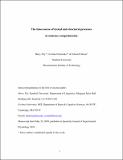| dc.contributor.author | Tily, Harry | |
| dc.contributor.author | Fedorenko, Evelina G. | |
| dc.contributor.author | Gibson, Edward A. | |
| dc.date.accessioned | 2011-06-28T15:53:32Z | |
| dc.date.available | 2011-06-28T15:53:32Z | |
| dc.date.issued | 2010-05 | |
| dc.date.submitted | 2009-05 | |
| dc.identifier.issn | 1747-0218 | |
| dc.identifier.issn | 1747-0226 | |
| dc.identifier.uri | http://hdl.handle.net/1721.1/64691 | |
| dc.description.abstract | Online sentence comprehension involves multiple types of cognitive processes: lexical processes such as lexical access, which call on the user's knowledge of the meaning of words in the language, and structural processes such as the integration of incoming words into an emerging representation. In this article, we investigate the temporal dynamics of lexical access and syntactic integration. Unlike much previous work that has relied on temporary ambiguity to investigate this question, we manipulate the frequency of the verb in unambiguous structures involving a well-studied syntactic complexity manipulation (subject- vs. object-extracted clefts). The results demonstrate that for high-frequency verbs, the difficulty of reading a more structurally complex object-extracted cleft structure relative to a less structurally complex subject-extracted cleft structure is largely experienced in the cleft region, whereas for low-frequency verbs this difficulty is largely experienced in the postcleft region. We interpret these results as evidence that some stages of structural processing follow lexical processing. Furthermore, we find evidence that structural processing may be delayed if lexical processing is costly, and that the delay is proportional to the difficulty of the lexical process. Implications of these results for contemporary accounts of sentence comprehension are discussed. | en_US |
| dc.language.iso | en_US | |
| dc.publisher | Psychology Press | en_US |
| dc.relation.isversionof | http://dx.doi.org/10.1080/17470210903114866 | en_US |
| dc.rights | Creative Commons Attribution-Noncommercial-Share Alike 3.0 | en_US |
| dc.rights.uri | http://creativecommons.org/licenses/by-nc-sa/3.0/ | en_US |
| dc.source | Prof. Gibson via Lisa Horowitz | en_US |
| dc.title | The Time-Course of Lexical and Structural Processes in Sentence Comprehension | en_US |
| dc.type | Article | en_US |
| dc.identifier.citation | Tily, Harry, Evelina Fedorenko and Edward Gibson. "The time-course of lexical and structural processes in sentence comprehension." Quarterly Journal of Experimental Psychology (Colchester). 2010 May;63(5):910-27. | en_US |
| dc.contributor.department | Massachusetts Institute of Technology. Department of Brain and Cognitive Sciences | en_US |
| dc.contributor.department | McGovern Institute for Brain Research at MIT | en_US |
| dc.contributor.approver | Gibson, Edward A. | |
| dc.contributor.mitauthor | Gibson, Edward A. | |
| dc.contributor.mitauthor | Fedorenko, Evelina G. | |
| dc.relation.journal | Quarterly Journal of Experimental Psychology | en_US |
| dc.eprint.version | Author's final manuscript | en_US |
| dc.identifier.pmid | 19746299 | |
| dc.type.uri | http://purl.org/eprint/type/JournalArticle | en_US |
| eprint.status | http://purl.org/eprint/status/PeerReviewed | en_US |
| dspace.orderedauthors | Tily, Harry; Fedorenko, Evelina; Gibson, Edward | en |
| dc.identifier.orcid | https://orcid.org/0000-0003-3823-514X | |
| dc.identifier.orcid | https://orcid.org/0000-0002-5912-883X | |
| mit.license | OPEN_ACCESS_POLICY | en_US |
| mit.metadata.status | Complete | |
